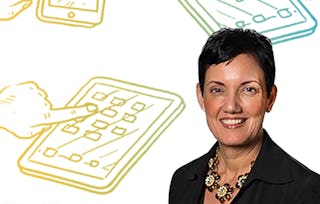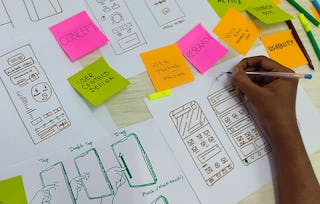Foundations of User Experience (UX) Design is the first of a series of seven courses that will equip you with the skills needed to apply to entry-level jobs in user experience design. UX designers focus on the interactions that people have with products like websites, mobile apps, and physical objects. UX designers make those everyday interactions usable, enjoyable, and accessible. The role of an entry-level UX designer might include empathizing with users, defining their pain points, coming up with ideas for design solutions, creating wireframes, prototypes, and mockups, and testing designs to get feedback.

Foundations of User Experience (UX) Design

Foundations of User Experience (UX) Design
This course is part of Google UX Design Professional Certificate

Instructor: Google Career Certificates
1,650,284 already enrolled
Included with
75,362 reviews
What you'll learn
Identify common job responsibilities of entry-level UX designers and other teams you might work with.
Understand foundational concepts in UX design, such as user-centered design, the design process, accessibility, and equity-focused design.
Explain why design sprints are an important and useful part of a UX designer’s work.
Skills you'll gain
Details to know

Add to your LinkedIn profile
See how employees at top companies are mastering in-demand skills

Build your Design and Product expertise
- Learn new concepts from industry experts
- Gain a foundational understanding of a subject or tool
- Develop job-relevant skills with hands-on projects
- Earn a shareable career certificate from Google

There are 4 modules in this course
User experience (UX) designers focus on the experience that users have while using products like websites, apps, and physical objects. UX designers make those everyday interactions useful, enjoyable, and accessible. In the first part of this course, you'll be introduced to the world of UX and the factors that contribute to great user experience design. You'll understand the job of a UX designer and teams that UX designers often work with. You’ll also get to know more about the expectations of the Google UX Design Certificate.
What's included
17 videos12 readings3 assignments2 plugins
UX designers always put the user first. In this part of the course, you'll be introduced to user-centered design and one of the design frameworks that UX designers use on the job. You'll also learn about design best practices, including the importance of inclusive design and accessibility when designing. In addition, you'll learn how to think across platforms to design seamless user experiences.
What's included
9 videos5 readings3 assignments
UX designers often participate in design sprints to define the direction of a product. In this part of the course, you'll explore the world of design sprints, including the phases of a design sprint and how to plan and participate in one. You'll also learn about retrospectives, which is a way to constructively reflect on a design sprint and identify areas of improvement to implement next time.
What's included
10 videos10 readings7 assignments1 plugin
As a UX designer, a portfolio is an opportunity to share your skills and experience with potential employers. Throughout these courses, you will complete activities that guide you through the process of creating your own portfolio website.
What's included
3 videos7 readings1 assignment1 plugin
Earn a career certificate
Add this credential to your LinkedIn profile, resume, or CV. Share it on social media and in your performance review.
Instructor

Offered by
Explore more from Design and Product
 Status: Free Trial
Status: Free TrialUniversity of Michigan
 Status: Free Trial
Status: Free Trial Status: Preview
Status: PreviewGeorgia Institute of Technology
 Status: Free Trial
Status: Free TrialIndian Institute of Technology Guwahati
Why people choose Coursera for their career

Felipe M.

Jennifer J.

Larry W.

Chaitanya A.
Learner reviews
- 5 stars
85.77%
- 4 stars
12.19%
- 3 stars
1.38%
- 2 stars
0.28%
- 1 star
0.37%
Showing 3 of 75362
Reviewed on Aug 28, 2022
I learned so much about the foundations of UX design, the various roles and processes that UX designers engage in daily. The overlay of videos, readings, and test modules helped solidify my learning.
Reviewed on Sep 7, 2025
The course is really helpful to get insights on the principles of UX and the process of working a a designer. The course personally help me to get the right understanding of the field of UI/UX Design
Reviewed on Feb 11, 2025
I have learn a lot of things about UX basics like role, responsibilities, what is user Experience, process of UX , its amazing course with Assignments that keep me uptodate with my learning material

Open new doors with Coursera Plus
Unlimited access to 10,000+ world-class courses, hands-on projects, and job-ready certificate programs - all included in your subscription
Advance your career with an online degree
Earn a degree from world-class universities - 100% online
Join over 3,400 global companies that choose Coursera for Business
Upskill your employees to excel in the digital economy
Frequently asked questions
User experience (UX) designers focus on the experience that users have while using products like websites, apps, and physical objects. UX designers make those everyday interactions useful, enjoyable, and accessible. The role of an entry-level UX designer might include coming up with ideas to address user problems, conducting research with users, and designing wireframes, mockups, and prototypes.
If you enjoy talking to and empathizing with people, drawing, thinking creatively, or paying attention to details, a job as a UX designer might be a good fit for you!
No prior experience with design or specific tools is required. All you need is an interest in creating great user experiences for apps, websites, and physical products!
Figma and Adobe XD are the design tools taught in this certificate program. Spreadsheets, word processing applications, and presentation applications will also be used. Throughout the program, you will create a professional portfolio, using the platform of your choice, to showcase your UX design work.
More questions
Financial aid available,
¹ Some assignments in this course are AI-graded. For these assignments, your data will be used in accordance with Coursera's Privacy Notice.

